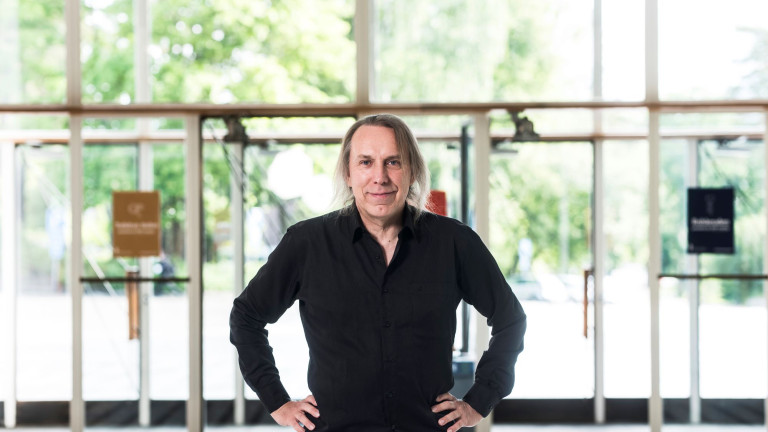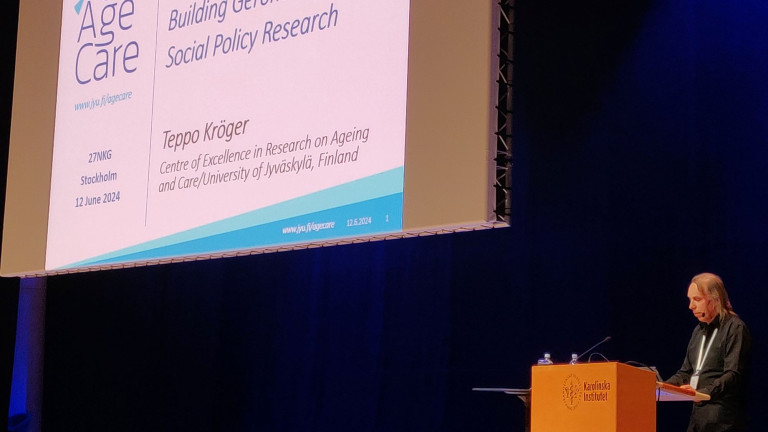
Award-winning Professor Teppo Kröger is grateful for his opportunities
Once the news media and professional publications discovered his expertise, requests for interviews started pouring in. When the problems of care homes for older people became widely known in 2019, a new phase began in Professor Teppo Kröger’s career.
“My resume now includes over 130 media appearances,” says 58-year-old Teppo Kröger, who is Professor of Social and Public Policy at the University of Jyväskylä and Director of the Centre of Excellence in Research on Ageing and Care.
“The crisis in the care home sector was a significant turning point in my career. I have always tried to accept all possible interviews. And I still vividly remember a time when I conducted research which nobody was interested in.”
The topic of older people’s care has thus remained at the forefront, and Kröger has discovered new influencing channels. Ministries in Finland ask for his expert opinion, and he receives a couple dozen invites to speak at different seminars and training events yearly.
His research career started at the University of Tampere in 1993, and before that, he worked as a social worker in Säynätsalo. Kröger started as a professor at the University of Jyväskylä in 2011.
His focus has remained on the care services and policies for older people. Kröger has succeeded in creating an updated overview for the public of the older people’s care services, mostly on the lack of care.
As an experienced researcher, Kröger wants to remind any starting researchers that promoting research results takes patience and resilience.
“It is important to be active, also on social media. Gradually, the work pays off.”
This year, Kröger received Päivikki and Sakari Sohlberg Foundation’s prestigious Sohlberg Award for his research on older people and the management of his research team.
“I am not a methods specialist, but have developed some terms”
Teppo Kröger has introduced various concepts specific to care policy. He is the researcher behind such terms as welfare municipality, care capital,and care poverty.
He says that the concepts enable seeing the world more clearly.
“I am not a method specialist, but have developed some terms,” says Kröger. “New concepts should always open new perspectives. They must push things forward.”
Over the years, he has seen many twists and turns in the care of older people: the continuing lack of care has not been fixed, but some good things occasionally come along.
“It was clear to me already at the beginning of my career that the care of the older people is the weakest link in the health and social services.”
Kröger has obtained a realistic view of the care sector through his own research and observations by his colleagues’, as well as from the media. Now, thanks to his media visibility in recent years, he has even more contacts with individual citizens.
“My own parents have passed away within the past five years. Through the care given to them, I was able to meet various professionals who did an excellent job, sometimes under difficult conditions.”
According to Kröger, good quality care for older people starts from good nurses, solid cooperation practices and the operational model: the ethical aspect of care is established already during one’s education and the operating model that supports the well-being of the older people comes from the work community.
“Good care homes exist, where things are going well,” Kröger continues.
“But, if there is a lack of resources, ethics is not going to help you out.”

The role of families has quietly grown
A strong divide in care services for older people is now being drawn between those who can afford the services and those whose families are able to help.
“The most vulnerable are those who live and are alone,” says Kröger. “They are mostly women, who live longer than men on average. This clearly involves a perspective related to gender equality, which I have waited to be discussed.”
“I am also worried about older couples. The common assumption is that partners can take care of each other, even when they both are already in need of care.”
Kröger estimates that in recent years the responsibility of the care has quietly shifted to families.
In home care, the services provided by the professionals have been drastically reduced, and there are not enough resources available to meet the need. In addition, the families of those in care homes actively participate in care duties, the quality and quantity of which has not really been researched in Finland.
Kröger says that this refers to “presumption of family”.
“Family members feed the older people and help in other ways,” continues Kröger. “They have a significant role, which may also be taken into account when planning shifts. Will this create inequality as regards to the care provided?”
The number of places in care centres has rapidly fallen
In the light of the number of places in residential and home care, the care situation has worsened in recent years.
Currently, about 15 percent of over 75-year-olds are in home care. About seven percent of people of the same age are in residential care. The number has fallen fast; in 2012 it was ten percent.
“The absolute number of places in care homes has not increased, even if the number of old people has,” explains Kröger. “It is a change in practice. It cannot be explained by the improved functioning of old people. At the same time, the number of people has increased in those age groups where care is most needed.”
When it comes to caregiving services for older people, Finland is lagging behind the Nordic countries. In the past, Finland was one of the leading countries in domestic care services.
“Finland was one of the best in this sector during the late 1980s and early 1990s. The recession halted the development, and the number of domestic care services fell by half in a short space of time.”
Kröger has not let the continuing grievances frustrate him.
“The discussions with my predecessors, such as Sirkka-Liisa Kivelä, have helped me tremendously,” says Kröger. “Now, it is my turn to make sure this topic remains in the public eye. I hope that grievances and criticism are not left unsaid. Maybe, things would be even worse if no one had expressed their opinions.”
He also hopes that this example encourages people to speak more freely about their issues and experiences related to care. This would make people’s voices more heard.
According to Kröger, the distribution of work is very clear: the researchers will promote their knowledge, the actual decisions depend on the decision-makers’ activity.
“It can also be questioned whether the sustainability gap of the public economy is caused by something completely different than the cost of care, which is small in comparison to, for example, pension expenditure and to many other public finance expenditure items,” explains Kröger. “The care of older people becomes a heavy burden for the families too, as it has cost implications.”

Career highlights
One of Teppo Kröger’s biggest achievements has been the establishment and management of the joint Centre of Excellence in Research on Ageing and Care of the University of Jyväskylä, the University of Helsinki and the Tampere University. The unit started its operations in 2018, and the research group now includes about 60 people. The funding will end in 2026.
Kröger says that the most important work for it has been done.
“A large-scale system is now up and running,” Kröger says.
“Good working conditions have been created for our young researchers. They have become independent operators, and that’s the most important thing. In that sense, it feels a bit like everyone is leaving the nest and spreading their wings.”
This autumn Kröger will be busy with a book project on care poverty. It will be completed by an international research network. The previous book on the topic was completed a couple of years ago. He considers writing books as an effective method for influencing debate.
“I have noticed that if you want an issue to be discussed in the research community, you have to first write a book about it. It will not end up there from the pages of a journal.”
In addition to his books, Kröger considers his career highlights to include the dissertations he has supervised, receiving funding from the Centre of Excellence, and the recent Sohlberg Prize 2024.
When receiving the award, he gave a thank you speech at an international congress of more than 800 colleagues. Getting used to various media appearances has left its mark.
“It was an important moment for me when I managed to get through an interview on live television for the first time.”








